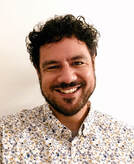Thinking of research in ethical terms
BY JOE JONES, RESEARCH CHAIR

Hello there! My name is Joe Jones and I am this year’s Research Chair for the Media Ethics Division of AEJMC.
In 2021, I completed my Ph.D. from the Missouri School of Journalism at the University of Missouri. Sadly, this is a few years too late for the moniker “Dr. Jones” to have pop culture cachet among most students. It’s not as if Indiana Jones was a moral exemplar for academics anyway. He seemed to continuously neglect his office hours, and I can imagine he was a scheduling nightmare to have as a committee member. The films introduced him as tenured, however, so maybe I will feel differently if I am able to achieve such status.
I am currently a Visiting Assistant Professor in the Reed College of Media at West Virginia University. I am a historian, care ethicist, and critical-cultural scholar concerned with the discursive construction and material consequences of race, gender, class, journalistic epistemologies, and the environment in media. My interests range from the history of the Black press, to the implications of objectivity in hard news reporting, to the ethical obligations of lifestyle journalists. This broad curiosity means I am genuinely excited to see the various submissions for next year’s conference in Washington D.C.
I firmly believe that everything we humans do should be imbued with ethical thinking and hope to see a wide range of topics, issues, fields, and approaches in the next round of conference submissions. In addition to submitting your own work, I politely request that you to talk to colleagues who do not typically think of their research in ethical terms and encourage them to submit to our division.
I recently talked to a scholar working on the framing of addiction in media. The person argued it was often reported as a moral issue rather than as a matter of health, working to stigmatize and harm an already vulnerable population. This scholar had never considered the Media Ethics Division as a place for their research, but I pointed out that this was exactly the kind of work MED is made for! With our group of scholars, practitioners, and educators, MED can offer constructive feedback and help amplify such positive potential of responsible media making. I have had similar conversations with colleagues in advertising, public relations, and sports journalism. Even if these individuals do not submit to our division, we can at least prompt them to think about their work in ethical terms. Everyone wins!
My tenured spouse has just informed me that tenure does not allow one to simply bunk off in the middle of the semester and go search for lost artifacts. Well, maybe archaeologists have different service requirements. Regardless, this Dr. Jones is looking forward to our next adventure together in D.C. Please feel free to contact me with any questions you might have. Take care and talk soon!
Yours,
Joe Jones
[email protected]
In 2021, I completed my Ph.D. from the Missouri School of Journalism at the University of Missouri. Sadly, this is a few years too late for the moniker “Dr. Jones” to have pop culture cachet among most students. It’s not as if Indiana Jones was a moral exemplar for academics anyway. He seemed to continuously neglect his office hours, and I can imagine he was a scheduling nightmare to have as a committee member. The films introduced him as tenured, however, so maybe I will feel differently if I am able to achieve such status.
I am currently a Visiting Assistant Professor in the Reed College of Media at West Virginia University. I am a historian, care ethicist, and critical-cultural scholar concerned with the discursive construction and material consequences of race, gender, class, journalistic epistemologies, and the environment in media. My interests range from the history of the Black press, to the implications of objectivity in hard news reporting, to the ethical obligations of lifestyle journalists. This broad curiosity means I am genuinely excited to see the various submissions for next year’s conference in Washington D.C.
I firmly believe that everything we humans do should be imbued with ethical thinking and hope to see a wide range of topics, issues, fields, and approaches in the next round of conference submissions. In addition to submitting your own work, I politely request that you to talk to colleagues who do not typically think of their research in ethical terms and encourage them to submit to our division.
I recently talked to a scholar working on the framing of addiction in media. The person argued it was often reported as a moral issue rather than as a matter of health, working to stigmatize and harm an already vulnerable population. This scholar had never considered the Media Ethics Division as a place for their research, but I pointed out that this was exactly the kind of work MED is made for! With our group of scholars, practitioners, and educators, MED can offer constructive feedback and help amplify such positive potential of responsible media making. I have had similar conversations with colleagues in advertising, public relations, and sports journalism. Even if these individuals do not submit to our division, we can at least prompt them to think about their work in ethical terms. Everyone wins!
My tenured spouse has just informed me that tenure does not allow one to simply bunk off in the middle of the semester and go search for lost artifacts. Well, maybe archaeologists have different service requirements. Regardless, this Dr. Jones is looking forward to our next adventure together in D.C. Please feel free to contact me with any questions you might have. Take care and talk soon!
Yours,
Joe Jones
[email protected]
